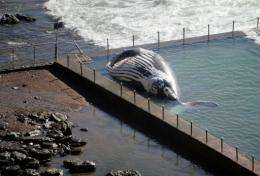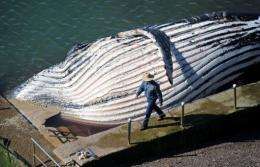Dead whale found in Australian ocean pool

A dead humpback whale washed up in a Sydney ocean pool Wednesday, surprising morning swimmers and causing a major headache for authorities who must now remove it.
The 11.6 metre (38 foot) young adult humpback, which appeared to have been dead for several days, washed up at Newport beach's ocean baths overnight as rough seas lashed parts of Australia's east coast.
Ocean baths are open-air man-made structures on the edge of the beach filled with sea water.
"It does have some external injuries but there's no way of knowing whether they were antemortem or postmortem," said Wendy McFarlane from the Organisation for the Rescue and Research of Cetaceans in Australia (ORRCA).
McFarlane said one possible explanation for the otherwise seemingly healthy animal, estimated to be about 25 to 30 tonnes, to die at sea could be that it had been struck by a ship.
Whales generate huge public interest in Australia and hundreds of people flocked to the beach to see the whale floating in the pool.

Sydney's Daily Telegraph said some locals were moved to tears.
"It's so sad but it is a natural thing to happen in nature," Lua Silva told the paper.
Newport beach, which is north of Sydney city, was closed because of the risk of sharks being attracted to the carcass as wildlife experts mulled their best options to remove the giant creature.
McFarlane said one option could be to demolish the pool wall and let the animal wash up on the beach.
Another solution could be to pull it out to sea at high tide, or bring in an excavator to lift it over the damaged pool wall at low tide.
National Parks and Wildlife Service spokesman Geoff Ross said old and sick humpbacks could wash up after big seas.
"In big seas the predators don't get the opportunity to deal with the carcass so it often washes in and we've seen that on several occasions over the last few years."
A dead and badly-decomposed 10-metre sperm whale washed up on the same beach in 2011, lodging itself on a rock platform. Another carcass hit nearby Palm Beach later that year but eventually washed out to sea.
Whales are often seen off Australia's coast in June and July as they make their annual winter migration from Antarctica up to the warmer waters off Queensland state, and again as they return before November.
National Parks and Wildlife Service area manager Chris Grudnoff said while a dead animal was unfortunate, it signalled there were increasing numbers of whales in the waters off Australia.
"The upside of the fact that we are seeing more dead whales is that it indicates that we have a whole healthy population out there in the ocean," he said.
(c) 2012 AFP



















